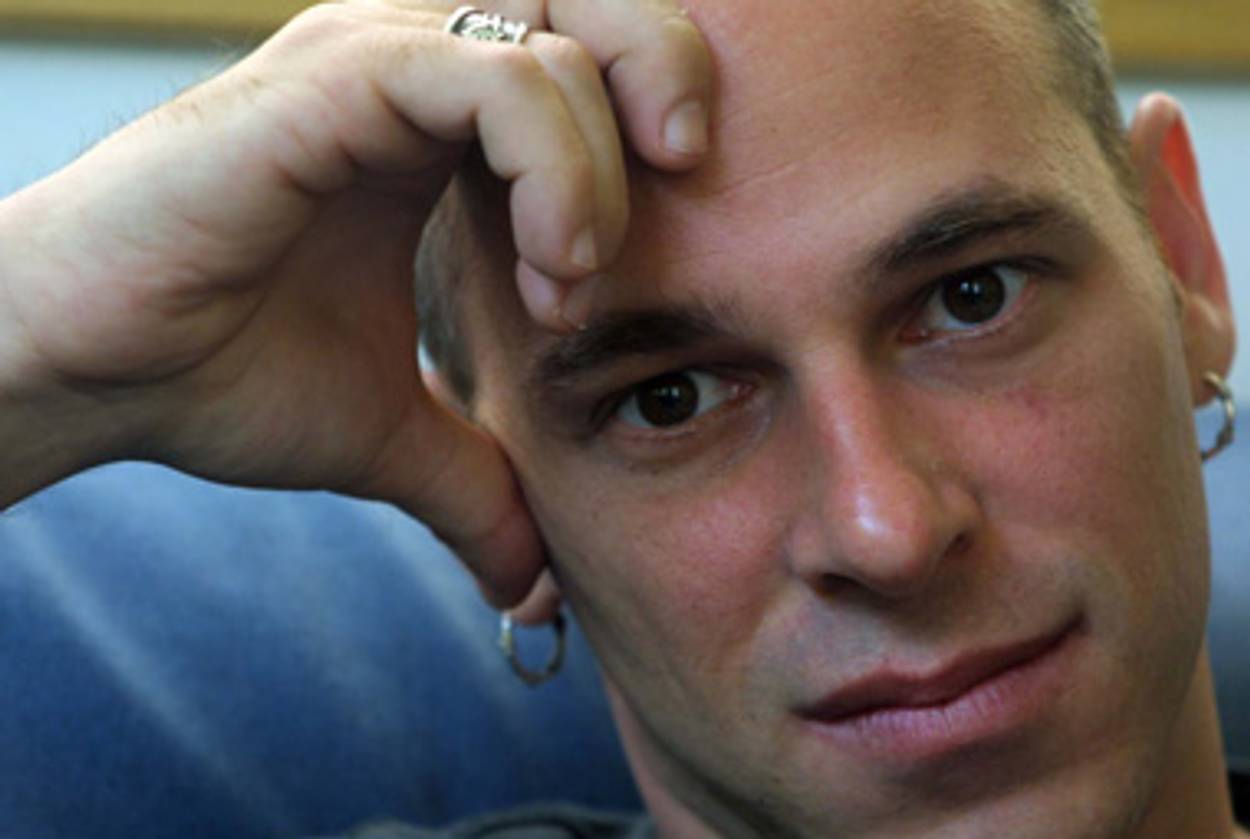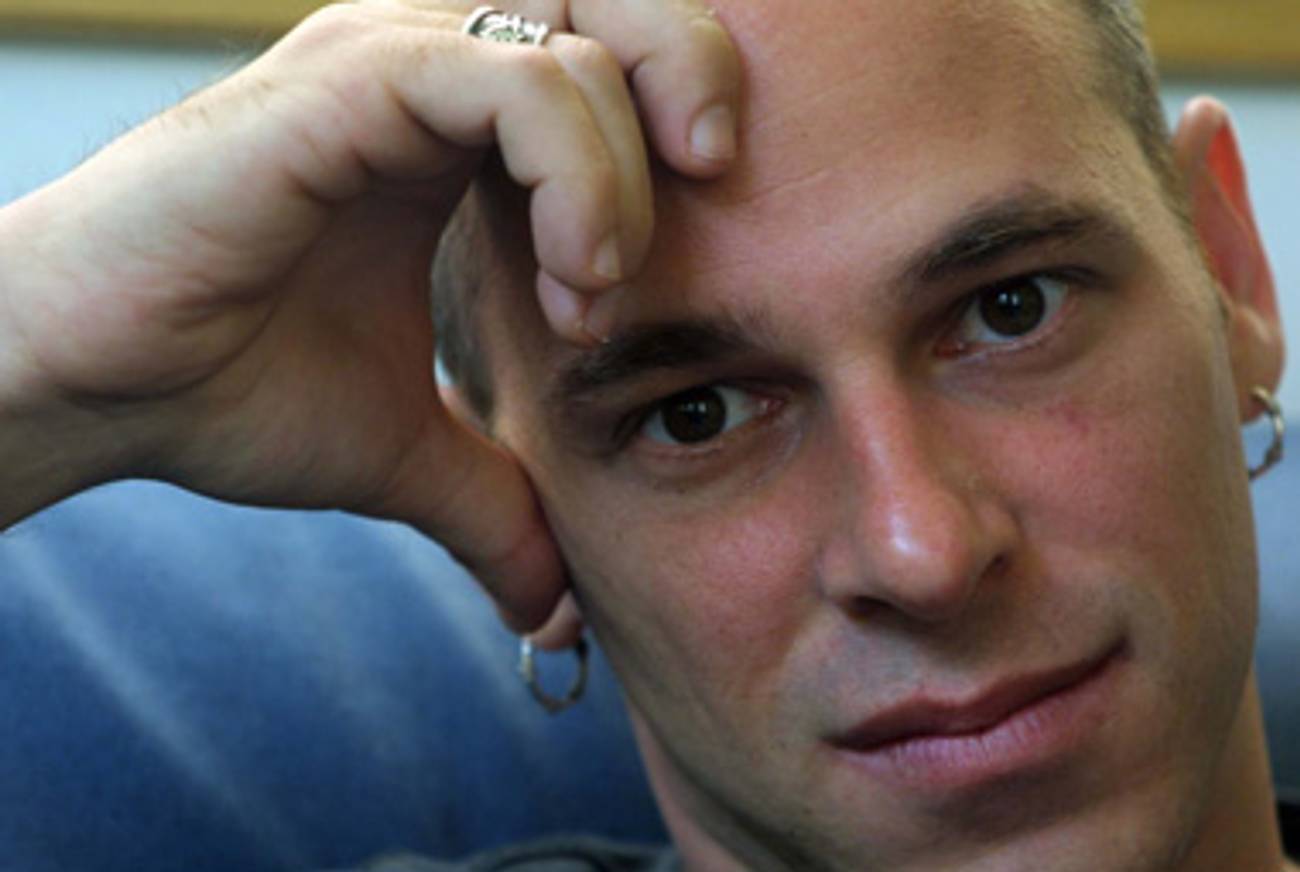Gritty Zionism
With his debut novel, essayist Gadi Taub shows an unfamiliar side of Israel—and of himself




“The strippers love the book,” says Gadi Taub. It is a bright mid-July afternoon in Tel Aviv. Taub is talking about Allenby, his best-selling debut novel about the employees and patrons of a Tel Aviv dive bar. Taub’s fictional bar is inspired by a real one, Allenby 40, a dimly lit watering hole known for its unusual hours: the regulars, many of them strippers, show up around 3 a.m. and often stay past 9:00 a.m. When the rest of the city is shuffling off to work, the denizens of Allenby 40, dubbed the city’s “sleaziest” club by Time Out Tel Aviv, are staggering on home—or still drinking and dancing.
Published in March, Allenby traces the consequences of a violent incident as it ripples through the lives of people living on the outskirts of society. The book has provoked debate in newspaper columns and book-review pages about the exploitation of women in the sex industry, the plight of the Israeli underclass, and the state of Hebrew prose. But no question, perhaps, has aroused as much speculation as this one: why is a highly regarded professor of communications and public policy at the Hebrew University of Jerusalem, a best-selling children’s book author, an acclaimed cultural critic, and a columnist for Israel’s largest-circulation daily, Yedioth Aharonoth, hanging out with strippers in a seedy Tel Aviv bar?
Largely unknown in America, Taub, 44, is an unusual hybrid of popular culture junkie and public intellectual. He seems equally confident debating the legacy of the philosopher Isaiah Berlin on stage at Mishkenot Shaananim, the handsome, wood-paneled cultural center in Jerusalem, as he is on the set of Mesudarim, a hit comedy series about four young dot-com millionaires in which Taub plays an all-bravado political spinmeister. (Think Ari Gold, Jeremy Piven’s scene-stealing super agent in HBO’s Entourage.) “What Gadi thinks, what Gadi writes, and what Gadi does are highly, highly consistent. That includes being honest about his emotional life in the red-light district,” says the literary critic Nissim Calderon, a close friend of Taub’s and his former co-editor at Mikarov, a journal of politics and culture they co-founded in the early 1990s.
“I immediately fell in love,” Taub says about his first visit to Allenby 40 a few years ago. Taub is seated amid the lunchtime bustle at Orna and Ella, a fashionable café on Sheinken Street. He’s dressed in an unbuttoned and untucked black and white pinstriped shirt, a white undershirt, stonewashed jeans, and sneakers. He is short, slight of build, and clean-shaven. A silver hoop earring dangles from each ear; his hair is closely cropped and receding. “It is a place where people who wouldn’t meet each other in any other context gather.” For a time, he rearranged his life around the nocturnal rhythms of the bar. “Instead of coffee for breakfast I would have a beer,” he says in excellent English. Many of the characters in Allenby are modeled on people Taub met at the bar.
The air of well-scrubbed affluence that fills Orna and Ella contrasts sharply with the grimy and impoverished world Taub depicts in Allenby, a book populated with hardscrabble characters that are at turns sympathetic and cruel. In one scene, for instance, a patron at the bar tries to provoke a fight with three Arabs, who manage to get away. “What a bummer,” the chief instigator blurts out, “beating Arabs is both a mitzvah and a pleasure.” It is a sentence that Taub overheard at Allenby 40. “It was important for me to show that the more neglected parts of society are generally more racist, more homophobic, and more chauvinistic,” he says, taking a drag of his Marlboro Medium.
That harsh reality is rendered in a unique, hard-boiled Hebrew. From the opening page, for example:
“An Allenby night crowd. Young, dressed for partying. A group of guys. A group of tourists. All girls. Twenty something. Shouting. Laughter. Some stopped to look. Others didn’t notice. The club’s neon sign blinked. Stripes: red, white, blue. The stripes changed the background for the club’s logo: Allenby Dancebar. The neon lit the girls near the railing. In red. In white. In blue.”
The staccato prose, Taub explains, is in part a protest against the vogue in Hebrew literature for long, metaphor-laden passages of psychological narration. “We don’t need 17 pages on the exact shade of what a character feels when he wakes up in the morning,” he says, slightly exasperated. A desire to beat Arabs needn’t be explained as a consequence of childhood trauma, lack of education, or abject poverty. Excessive psychologizing, Taub says, is “the opposite of storytelling.” More, it conveys a sense that “self-indulgence is the order of the day.” He takes a sip of Diet Coke. “My characters are not prone to deep introspection; they have to make difficult decisions in difficult situations. And I like that, because drama is about taking responsibility and meeting life head-on.”
Taub’s scholarship is as eclectic as his resume. He has written about Quentin Tarantino, Theodor Herzl, American history, incest, Richard Rorty, psychoanalysis, the Enlightenment, and Raymond Carver. Next year, Yale University Press will publish The Settlers and the Struggle over the Meaning of Zionism, a lucid study of the intellectual and theological origins of the religious settler movement. Taub, an outspoken opponent of Jewish settlements on the West Bank, says the book is his attempt to better understand the ideas that animate an enterprise so at odds with his own definition of Zionism: the belief in a democratic, Jewish-majority state. Originally published in Hebrew in 2007, it will be Taub’s first adult book to appear in English.
“Gadi has the rare quality of integrity, both in his politics and his literary work,” Amos Oz says from his home in Arad, a desert town in southern Israel. “I have great respect for Gadi’s literary talent as well as his sharp intellectual wit. He is likely to become more prominent in the future because he speaks in a clear and loud voice.” Alexander Yakobson, a professor of history at the Hebrew University, has an earthier explanation for Taub’s appeal: “Gadi makes Zionism sexy.”
Taub burst onto the intellectual scene in 1997 with the publication of The Dispirited Rebellion: Essays on Contemporary Israeli Culture, a sharp rebuke of his generation’s embrace of postmodern relativism, political disillusionment, and ironic detachment. “Given that Jewish nationhood is an established fact,” Taub wrote at the time, “the prettified alienation of intellectuals from Judaism and nationalism is no more than an empty arrogance which renders them irrelevant, cutting them off from both Israeli politics and the spirit of the Israeli public.” Such sentiments were not received with gratitude. “He was hated by many of his friends on the left,” says Nissim Calderon.
A self-described “ardent Zionist,” Taub has spent the better part of his career in combat with post-Zionists, a small but prominent cadre of academics, artists, and journalists who advocate Israel shedding its Jewish identity and forging some sort of one-state arrangement with the Palestinians. “Post-Zionists have successfully managed to confuse the debate to such an extent that most educated young people view Zionism as first and foremost suspect, guilty until proven otherwise,” Taub says, “This is not healthy.”
It is the messianic settlers, he argues, that “are the most present danger to Zionism.” That perspective forms the core of Taub’s forthcoming book. “Settlement is the opposite of Zionism,” Taub says. “Anyone in America who thinks they are defending Zionism by defending settlements is mistaken. Zionism depends on the right of all peoples to self-determination—including Palestinians. So the logic of Zionism is the logic of partition.”
In many respects, Taub represents a return to an older tradition of the writer’s role in Israeli society. Taub’s generation has largely eschewed the strong moral and ideological stances of its literary elders. Oz, the epitome of the politically engaged novelist, describes Taub as “one of the few members of the younger generation of Israeli writers who is politically active and politically involved.”
When asked about how he sees his role as a public intellectual, Taub borrows a seafaring metaphor from the philosopher Michael Walzer. If you want to be a serious social critic, Walzer argues, you must be a member of society, a part of the ship’s crew, not a bystander floating safely on a nearby lifeboat. “If you have no residue of love for the society you are criticizing people are not going to use your criticism constructively,” Taub says. “I feel like a lot of the left wants to be labeled as outsiders to feel cleansed of the sins of their society. But telling the ship it should drown is easy for intellectuals and academics; we have a protected enclave, and we can leave. We can teach physics in England or American history in France.” But if you are a bouncer at a dive bar in Tel Aviv, for instance, “it is difficult to move to France.” Taub sits quietly for a moment. “If the ship sinks, a lot of people go down with it.”
Evan R. Goldstein is a staff editor at The Chronicle of Higher Education.
Evan R. Goldstein is a staff editor at The Chronicle of Higher Education.